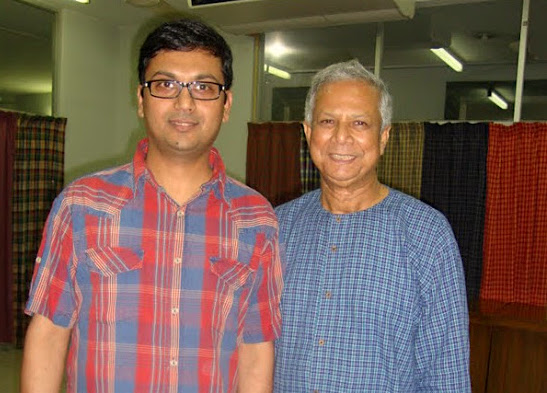Early Rejection Still Leads To Global Health Career
Wednesday, January 4, 2017

Kallol Mukherji with Nobel Peace Prize winner and Grameen Bank founder Muhammad Yunus.
For Kallol Mukherji, not getting hired in 2009 for a research assistant job at WDI led to a “life-changing” career in global health.
“While I did not get hired for that specific job, the interview process introduced me to the wonderful work that WDI does in providing market-based solutions in emerging economies,” said Mukherji, at the time a graduate student at the University of Michigan’s School of Public Health. “The core base of the pyramid (BoP) work was of interest to me, but what intrigued me most was the private sector-based solutions to real world challenges.”
Despite the early rejection, Mukherji stayed in touch with the Institute. When he saw a 2010 WDI summer internship opportunity with GE Healthcare that “suited my profile to a tee,” he applied and, in his words, was “second time lucky.” He got the internship and was dispatched to Bangladesh.
At the time, GE Healthcare was partnering with the Grameen Foundation to strengthen its healthcare delivery model in rural Bangladesh, with an emphasis on maternal and child health. Mukherji’s task was to create a referral network around existing Grameen health clinics, establish the process flow and define success indicators of the GE/Grameen partnership.
“This was a fantastic opportunity for me to use my public health skills along with designing a market-based solution in a fragile health system,” Mukherji said. “The opportunity to work with a team led by a Nobel laureate (Grameen Bank founder Muhammad Yunus) was an equally good incentive, too.”
Mukherji said the WDI internship was “life changing,” and he was thrilled to travel to Bangladesh for the first time and visit the country where his grandfather had been born 100 years earlier. While he had previous public health work experience, the domain and environment the internship provided was unique, he said.
“Working with multiple variabilities of a mixed health system and catering to the needs of a very diverse pool of stakeholders was an exciting experience for me,” Mukherji said. “Getting exposed to cutting-edge technologies that GE brought to the table and finding their suitability in resource-constrained settings with support of a passionate team from Grameen was an exhilarating experience. The project brought to the fore the value of collaboration and how each stakeholder’s strength could be used for the benefit of common good.”
His summer of work impressed GE Healthcare and Mukherji was offered a full-time job when he graduated. He worked on the company’s Healthymagination initiative for nearly five years on three different continents.
“Without the WDI opportunity, a lot of this would have been very difficult to make happen,” he said. “The internship was, in many ways, a turning point in my career, and it nudged me to look for market-based solutions in resource-constrained settings irrespective of the complexity of the challenges.”
Mukherji currently is based in Washington, D.C. and is the senior manager of Integrated Service Delivery for Population Services International (PSI), a global health network of more than 50 local organizations focused on issues such as family planning, HIV and AIDS, barriers to maternal health, and the biggest challenges to children under five, including malaria, diarrhea, pneumonia and malnutrition. He says his work connects well with his duties as a WDI intern.
“My primary goal is to align our service delivery model in developing countries to ensure quality healthcare services for the BoP population,” he said. “Delivering healthcare services to over 9 million clients per year and ensuring continuity of care in a mixed health system are two areas I feel passionate about and am thankful to PSI for providing an opportunity to positively impact such a diverse population.”
Mukherji’s goal as a graduate student was to work globally, and to date, he’s worked in 13 countries.
“The WDI internship not just cemented that desire but also taught me a completely new approach in solving developmental challenges in emerging markets,” he said. “The role of the private sector as a market enabler to solve real world challenges would most probably have been left out from my possible solution basket for developmental good had I not been part of the WDI internship.”
He said to this day he continues to draw inspiration for his current work at PSI from his WDI internship and work with GE Healthcare.
“It surely did provide me the confidence to be able to face public health challenges head-on,” he said. “Had it not been for the internship experience, it surely would have been difficult for a public health enthusiast from Asia to lead an innovative health initiative in Africa as part of a large multinational healthcare company with its headquarters in the U.S.”
Note: This is one in an ongoing series of articles profiling past WDI interns and Multidisciplinary Action Project (MAP) team members and their career paths. Additional profiles in the series may be found here.
